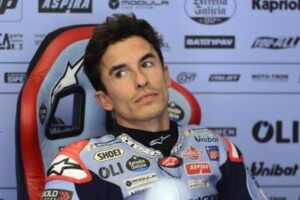In a dramatic turn of events at the MotoGP Italian Grand Prix, Marc Marquez, a name synonymous with tenacity and relentless pursuit of victory, made the uncharacteristic decision to concede his fight for a podium finish. This unexpected move sent ripples through the racing community, highlighting the ever-intensifying competition and strategic complexities of the sport.
The Italian Grand Prix, held at the iconic Mugello Circuit, is renowned for its demanding layout, which tests the limits of both rider and machine. As the race unfolded, it became apparent that Marquez, despite his best efforts, was not in a position to secure a podium spot. This realization came after a series of intense laps where the Repsol Honda rider battled fiercely with his rivals, showcasing his skill and determination.
Marquez’s decision to “give up” the podium chase was not one made lightly. The Spaniard, an eight-time world champion, has built his career on pushing the envelope and defying the odds. However, the dynamics of MotoGP racing have evolved, with a new generation of riders and technological advancements raising the stakes. In this context, Marquez’s choice reflects a deeper understanding of the strategic elements at play in modern MotoGP.

During the race, Marquez found himself locked in a gripping duel with Ducati’s Francesco Bagnaia and Yamaha’s Fabio Quartararo. The trio exchanged positions multiple times, thrilling fans with their high-speed maneuvers and tactical acumen. However, as the laps dwindled, it became clear that Marquez was struggling to maintain the pace required to challenge for the top three positions.
In a post-race interview, Marquez elaborated on his decision. “It was a tough race, and I gave it everything I had,” he said. “But sometimes, you have to make a strategic call. Pushing beyond the limit could have resulted in a crash or a worse outcome. Today, it was about bringing the bike home and gathering crucial points for the championship.”
This pragmatic approach is indicative of Marquez’s maturity and his evolving racing philosophy. Known for his aggressive riding style and willingness to take risks, Marquez has had his fair share of spectacular victories and heart-stopping crashes. His decision at Mugello suggests a shift towards a more calculated approach, balancing the pursuit of glory with the need for consistency and long-term success.
The race itself was a testament to the growing competitiveness of MotoGP. Bagnaia, riding the factory Ducati, showcased the power and precision of the Italian machine, ultimately taking the victory. Quartararo, the reigning world champion, displayed his trademark smooth riding style, securing a solid second place. Meanwhile, Marquez’s fourth-place finish, while not a podium, was a reminder of his resilience and ability to adapt.
Fans and analysts alike have been quick to weigh in on Marquez’s decision. Some see it as a sign of wisdom and strategic thinking, necessary traits for longevity in the sport. Others, however, lament the perceived lack of the fiery spirit that has defined his career. Regardless of the perspective, it is clear that Marquez’s choice underscores the intricate balance required in MotoGP between aggression and prudence.

As the season progresses, all eyes will be on Marquez to see how this experience influences his future races. With several rounds remaining, the battle for the championship is far from over. Marquez’s willingness to adapt and make tough decisions may well prove to be his greatest asset as he navigates the challenges ahead.
In the high-octane world of MotoGP, where every decision is scrutinized and every race can alter the championship landscape, Marc Marquez’s calculated acceptance of a podium defeat at the Italian Grand Prix serves as a poignant reminder of the sport’s relentless and evolving nature.

